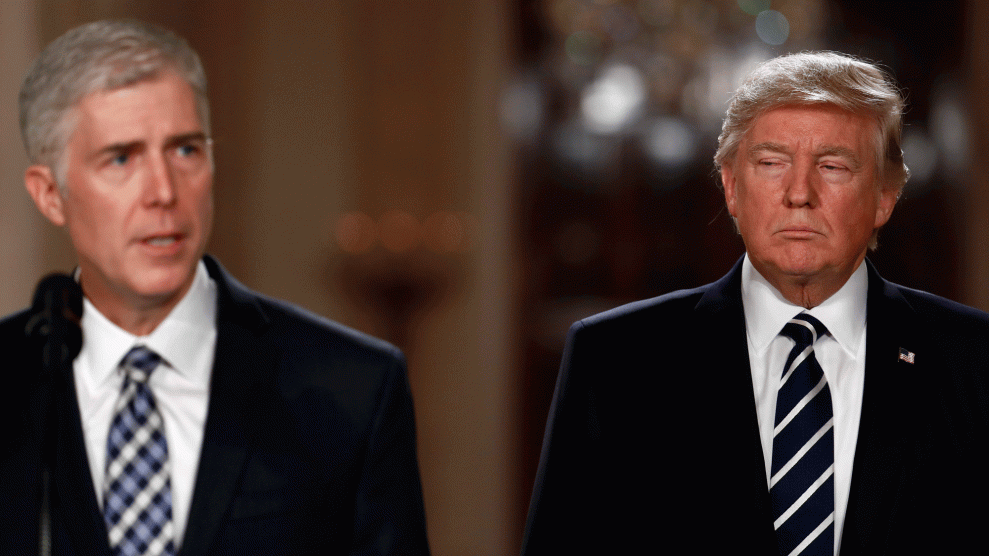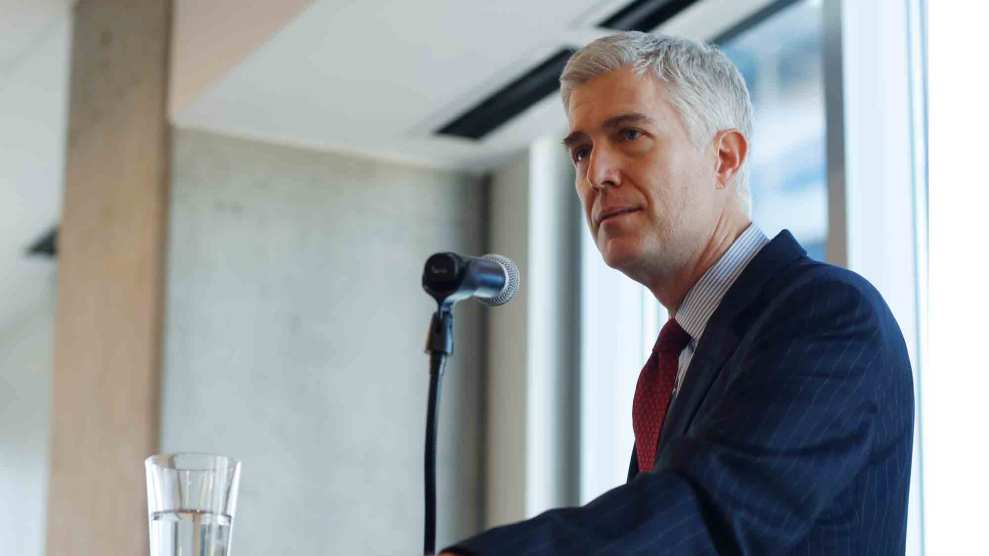
Supreme Court nominee Neil Gorsuch appearing for the first time with President Donald TrumpAP Photo/Carolyn Kaster
During his confirmation hearings, scheduled to begin March 20, Supreme Court nominee Neil Gorsuch will face a thorough grilling about his legal philosophy. Among the topics likely to come up are his views on “natural law” and his relationship with John Finnis, the Oxford University professor who advised Gorsuch on his Ph.D. thesis and one the world’s leading proponents of this arcane legal theory.
Natural law is a loosely defined term, but to many of its conservative US adherents it is essentially seen as God’s law—a set of moral absolutes underpinning society itself. In recent years, natural law believers have invoked this legal theory to defend a range of anti-gay policies.
Natural law has been a source of controversy for at least two previous Supreme Court nominees in recent decades—for dramatically different reasons. In 1991, Harvard law professor Laurence Tribe wrote a New York Times op-ed opposing the nomination of Justice Clarence Thomas because he would be the “first Supreme Court nominee in 50 years to maintain that natural law should be readily consulted in constitutional interpretation.” Reagan nominee Robert Bork, on the other hand, was criticized for not believing in natural law by then-Sen. Joe Biden (D-Del.), no less. Biden told Bork at his confirmation hearing, “As a child of God, I believe my rights are not derived from the Constitution…They were given to me and each of my fellow citizens by our creator.”
Bork, who was ultimately rejected by the Senate, had scoffed at the idea that judges could know God’s law and implement it. Later, in a 1992 essay, he warned that if natural law proponents “persuade judges that natural law is their domain, the theorists will find that they have merely given judges rein to lay down their own moral and political predilections as the law of the Constitution. Once that happens, the moral reasoning of the rest of us is made irrelevant.”
Natural law theory dates back to Thomas Aquinas and the Greeks before him. It isn’t necessarily liberal or conservative. Lawyers from the natural-law legal camp helped formulate the Universal Declaration of Human Rights in 1948, a seminal document in which 48 countries committed to pursuing progressive measures that would protect human rights and fundamental freedoms.
In the United States, natural law has taken on a variety of interpretations. One proponent was David Lane, a white supremacist implicated in the murder of Alan Berg, a Jewish radio talk show host in Gorsuch’s hometown of Denver. Lane’s followers gunned down Berg in his driveway in 1984. Lane, who died in 2007, claimed that natural law justified any act, however heinous, that preserved the perpetuation of a race—in his case, the white race.
American conservatives, including Justice Thomas, use the term “natural law” to suggest that the Constitution and the Declaration of Independence were divinely inspired. Former Sen. Jim DeMint (R-S.C.), now the president of the conservative Heritage Institute think tank, explained in an essay last summer, “Our rights as Americans are considered unalienable only because they were inherent in the natural order of life established by the laws of nature and nature’s God.”
Where does Gorsuch fit into all this? In the 1990s, he studied legal philosophy at Oxford under Finnis. Gorsuch, who received his doctorate in 2004, has remained close to his former mentor, whom he credits in the 2006 book that grew out of his Oxford thesis, The Future of Assisted Suicide and Euthanasia. In a 2011 speech at Notre Dame law school honoring the Australian-born academic, Gorsuch fondly recalled the “red ink he poured so carefully—and generously—over the papers we produced.” He declared, “I have encountered few such patient, kind and generous teachers in my life.” (Finnis did not respond for a request for comment. He has publicly declined to discuss Gorsuch, telling the Guardian earlier this month, “I have resolved not to say anything to anyone at all.”)
Finnis, who is 76, is considered a brilliant and influential legal philosopher. In 1980, he published a definitive text on natural-law legal theory, Natural Law and Natural Rights, in which he identified seven “basic goods” that are central to human well-being: life, knowledge, play, aesthetic experience, sociability of friendship, practical reasonableness, and religion. From there, he sought to outline an ethical framework for viewing law and justice. He believes all human life is innately valuable and intrinsically good, and not because it might be useful to others, as some utilitarian philosophers might argue.
Melissa Moschella, an assistant professor of philosophy at the Catholic University of America who knows Finnis, says natural law is “a theory about what’s right and wrong, and it’s based on what, through reason, we can know about what’s good and bad for human beings, so that we act in ways that are always respectful of the well being of ourselves and others.”
On many levels, Finnis’ philosophy is profoundly humane. It led him to oppose the death penalty and to become an outspoken advocate for nuclear disarmament in the 1980s. He believed that even threatening to use nuclear weapons was immoral because it indicated a willingness to kill innocent civilians indiscriminately. Natural law also made him a foe of abortion and assisted suicide. While his work doesn’t invoke the divine, as DeMint and others have, Finnis’ views square with his Catholic faith: He converted to Catholicism in 1962 and has advised the Vatican on Catholic social teaching.
Not long after his conversion, Finnis discovered Germain Grisez, a French American natural-law philosopher and a prominent defender of the Church’s opposition to contraception. Griesz and Finnis began to collaborate, and Finnis’ work grew both more conservative and more focused on sex, particularly gay sex.
In 1993, Finnis testified for the state of Colorado in a case challenging Amendment 2, a ballot initiative that would have banned local governments from passing human rights ordinances or other anti-discrimination laws that would protect LGBT people. State Solicitor General Timothy Tymkovich, who now serves alongside Gorsuch on the 10th Circuit Court of Appeals, brought Finnis in to explain the allegedly classical roots of anti-gay prohibitions going back to Socrates. In his trial testimony, Finnis compared gay sex to bestiality “because it is divorced from the expressing of an intelligible common good,” according to part of his deposition published by The New Republic.
Martha Nussbaum, a prominent professor of law and ethics at the University of Chicago, served as an expert for the other side, suggesting that Finnis was misinterpreting the Greeks, who clearly had some acceptance of homosexuality in their culture. Nussbaum’s side ultimately prevailed at trial and at the US Supreme Court in its landmark decision in Romer v. Evans.
Nussbaum says Finnis “is a very fine moral philosopher” and “author of important books that I admire.” But she notes that his work on sexual orientation has less going for it. “Finnis’s book Natural Law and Natural Rights is entirely different from the ‘new natural law’ work inspired by Germain Grisez that he got into later,” Nussbaum writes in an email. “The former is excellent philosophy, the latter arcane and strange conservative argument. In England Finnis on the whole focused on philosophy, and people were shocked by some of the things he published beginning in 1994.”
That year, he authored an article titled “Law, Morality, and ‘Sexual Orientation.'” In it, Finnis insisted that “homosexual orientation” was a “deliberate willingness to promote and engage in homosexual acts—a state of mind, will, and character whose self-interpretation came to be expressed in the deplorable but helpfully revealing name ‘gay.'”
Finnis’ students have deployed his legal theories to battle same-sex marriage in the United States. Among his best-known acolytes is Princeton professor Robert George, who co-founded the anti-gay National Organization for Marriage. George filed a brief in the 2013 Supreme Court case over the same-sex marriage ballot initiative in California, Proposition 8, and he also testified for the state of Colorado in the 1993 anti-discrimination case along with his former teacher.
Gorsuch’s long relationship with Finnis has put him in close company with George and other anti-gay figures. When Gorsuch spoke at Notre Dame in 2011, he shared the stage with anti-gay theorists including George and Germain Grisez. Gorsuch has also worked with George on academic projects, including his tome on assisted suicide, which was part of a series of books George edited at Princeton University Press. George recently wrote an op-ed in the Washington Post supporting Gorsuch’s Supreme Court nomination.
Whether Gorsuch adheres to the same natural law philosophy as George and Finnis about the alleged societal harm of homosexuality is hard to know. His book on assisted suicide mentions Supreme Court cases involving gay rights, but only as reference points for analyzing the court’s thinking, not his own, and its relevance to euthanasia. He’s hired openly gay clerks and attends a liberal Episcopal church in very liberal Boulder, Colorado, and gay friends attested to his openness in a recent New York Times story.
But he also voted in favor of Hobby Lobby, the craft store whose owners sued the Obama administration, alleging that the company’s religious freedom rights were violated by the Affordable Care Act’s requirement that employers provide health insurance that covers contraception. That decision might square with a natural-law view respecting the exercise of religion as a critical human right, but it also may have led to more persecution of LGBT people. The Supreme Court decision upholding that ruling has since been used to defend businesses that have discriminated against LGBT people—a view some lower courts have upheld. The Hobby Lobby case was brought by the Beckett Fund for Religious Liberty, a religious nonprofit law firm on whose board George serves.
Catholic University’s Moschella says Finnis makes a distinction in his work between morality and the law. He believes that what a judge does on the bench is not determined by natural law but rather by the laws of that nation. So if Gorsuch really does endorse Finnis’ philosophy, Moschella says, his moral views on abortion, gay rights, and other hot-button issues and what natural law says about them is irrelevant. She says, “What is relevant to his work as a judge is his commitment, which is also a moral commitment, to upholding the law of the land.”
















